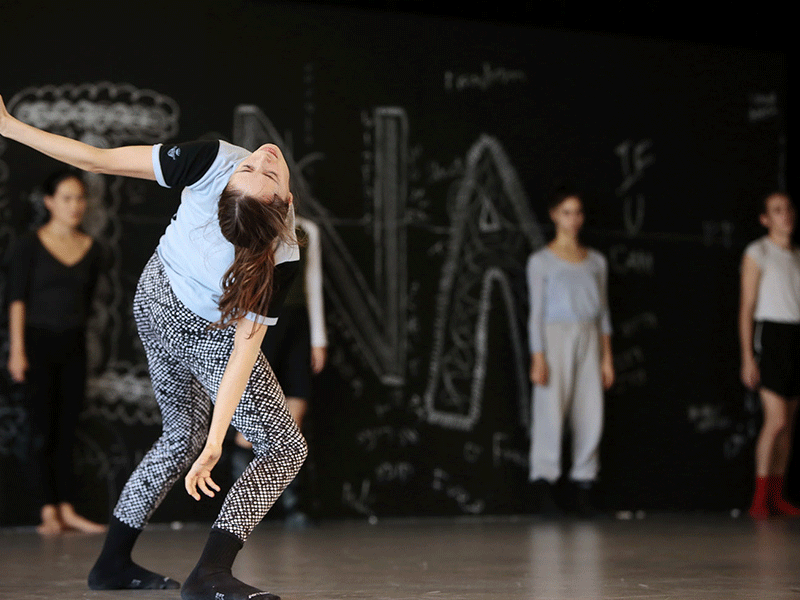To call Amalia Smith’s musical talent genetic would be the understatement of Canada’s 150th year.
“My father is a music teacher on the [Salt Spring] Island and also played in the Calgary Philharmonic, Edmonton Jazz Festival and Prince George Symphony. My mother, although not a musician, was in the Alberta Ballet, Ontario Ballet Theatre and Ballet North in her 20s,” she said.
Born on the west coast of Canada in 1994, 23-year-old Smith practically danced before she walked.
“My mother taught me to dance at the age of three,” she said.
While Smith dabbled in athletics, music and school growing up, claiming, “I was pretty much into everything but dance,” she rekindled her passion for dance at age 13.
She joined Arts Umbrella in Grade 11 and made her first big move away from home in 2010, when she left her small town on Salt Spring Island for the big city of Vancouver. Little did she know that awaiting her on the other side was an opportunity of a lifetime.
Not long after being introduced to Gaga, a contemporary dance language developed by Batsheva’s own Ohad Naharin, during a four-week intensive program at the San Francisco Conservatory, she was invited to join Israel’s internationally acclaimed Batsheva Dance program. In 2014, she landed in Tel Aviv to join Batsheva’s Young Ensemble and begin her next great adventure.
“Speaking honestly, the main challenge for me is still being away from my family,” Smith admits. “Just to have that comfort, emotional stability and sense of true home. Accepting the term ‘home’ as wherever I’m currently living is always the hardest.”
“Growing up in small towns is all I knew,” Smith explains. “We lived in Ucluelet on Vancouver Island before moving to Salt Spring. It’s extreme in its own way, but I would have never wished for anything different. My family is very close-knit because of it. There is a deeply rooted sense of community in small towns … something you don’t find so easily in urban areas.”
Smith attributes her artistic success to growing up isolated in nature with family. “It makes a child more in tune to their creativity,” she says.
Nonetheless, living away from home got easier with time and Smith quickly came to love Tel Aviv’s fast-paced urban landscape, especially the backdrop it provides for the local dance community.
“There is so much happening (in Tel Aviv) dance and project-wise all the time, even though there isn’t that much government support for the art,” Smith says.
Politics aside, the support Naharin offers his Batsheva dancers is limitless. Smith’s graduation from the Young Ensemble to the Batsheva Dance Company, just in time for a brand new performance, is a prime example.
“On Tuesday, I was in the ensemble and had a performance of Kamuyot. And on Wednesday, I joined the main company for my first day on the job.”
When it comes to the company’s internal makeup, Naharin wastes no time.
“It is a very huge step,” Smith shares. “I didn’t have much time to get nervous though because I only had 21 days from the time they told me about the contract to my start date, and we began right away with the new creation. It was a major adjustment to make, but I’m very happy.”
The new creation is called Venezuela, and is chock-full of surprises.
“Ohad is always full of surprises, but this is by far the best,” Smith says. “There are elements of ballroom, which are incredibly challenging and add an interesting mix to how we move normally. As we stand right now, we have plenty of time to make many changes, which keeps us on our toes.”
The company’s international makeup also opens the floor to so many different voices — Israeli, American, Russian, Korean and, now, Canadian.
As the only current Canadian in Batsheva, Smith feels a responsibility to represent her country. “When there are other dancers coming to Israel from Canada, whether we’re friends or just acquaintances, I enjoy helping them find a place to stay, showing them around, taking them to the best places to eat, telling them where not to go, etc.”
She offers some advice for Canadians (whether they be dancers or not) coming to Israel: “Israel takes a great deal of patience and letting go, especially during the adjustment period of first moving here. But then, you eventually learn to fall in love with the place.”
As for whether she will stay with Batsheva for the rest of her career, she says that, “For right now, this is exactly where I want to be.”
Venezuela will premiere on May 12 at the Suzanne Dellal Center in Tel Aviv.







